There are few trends in economic history that have proven as influential and disruptive as app-based online payments. The market for digital payment gateways, which includes massive global companies such as MuchBetter and Skrill, was worth $3.53 trillion in 2018, but is expected to be worth a staggering $19.89 trillion in terms of transaction value by 2026.
Across virtually every industry, digital payment gateways have been adopted en masse as a way of bringing added convenience to customers, while also providing numerous benefits to the businesses themselves. Let’s further explore the long-term business advantages of digital payment gateways, in order to get a better idea of what kind of businesses should be adopting them in 2020.

Source: Pixabay
Case Study: An Indian Online Casino
In order to properly situate the multifaceted business use cases of digital payment platforms, it helps to look at a case study that serves as an effective cross-section of the issues at stake. Royal Panda, an international online casino that offers real-money slots, table games, and sports betting to customers across India, is an illustrative example.
While Royal Panda does allow customers to make deposits and withdraw winnings via ‘traditional’ bank transfer and debit card methods, it also offers extensive options for digital payment gateway users. As well as global platforms such as Neteller and Skrill, Royal Panda also allows Indian customers to use MuchBetter, a payments app that is widely used in the Indian market, with the company’s headquarters being based in Bangalore.
This substantive offering of digital payment app options, which includes strictly local apps, has a number of benefits for Royal Panda and its Indian casino gamers. First, it allows Royal Panda to broaden its target audience by making its services as accessible as possible. By offering hyperlocal apps such as MuchBetter as a payment option, it can heighten its appeal among its Indian players, reassuring them that they offer a localized service.
Both Royal Panda and its customers in India can also enjoy the enhanced security that comes with using such apps to process payments, as they tend to offer airtight, end-to-end encryption, and two-factor authentication. Apps like MuchBetter also allow casino gamers in India to enjoy more discrete gaming, with their transaction data only showing up in the app, rather than on a monthly debit card bill. Since the casino industry appreciates the value of discretion more than most, this is a factor that cannot be ignored.

Source: Pixabay
What Kind of Businesses Should Be Allowing App Payments?
Taking this case study into account, it’s worth expanding to consider what types of businesses should be making the adoption of digital payment gateways a key priority. Any company that targets international audiences should adopt them as a basic prerequisite.
Payment gateways allow for free, secure overseas transactions, something that a traditional bank transfer might not allow for. Including a hyperlocal payment app like MuchNetter is absolutely essential if your business is attempting to target consumers in a specific market.
If the bulk of orders that a business receives are done via an online store, for example as in an e-commerce business, then offering as a wide a range as possible of payment apps will ensure that customers are not alienated and can access your goods and services easily.
If you’re a smaller business that does not have the resources to provide in-house data security for customers, then adopting certain payment gateways can be a way of cheaply outsourcing this. Companies such as Skrill and PaySafeCard have extensive cybersecurity infrastructure to protect yours and your customers’ financial data so that you don’t have to.
There are many benefits of adopting online payment gateways for your business, and many industries where these benefits apply. If you don’t want to get left behind, it’s time to embrace the digital payment revolution today.

































